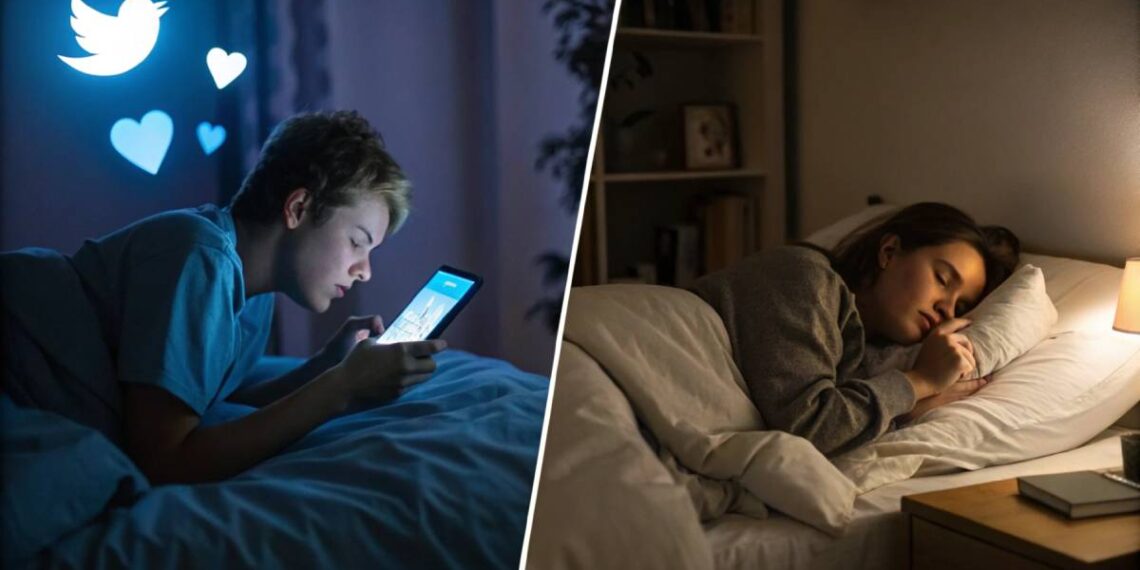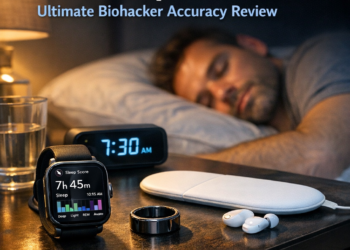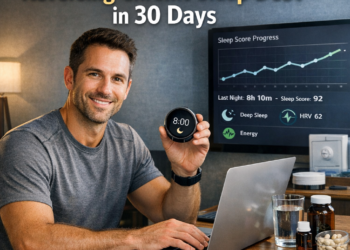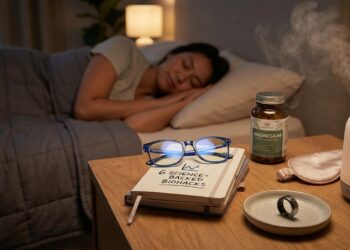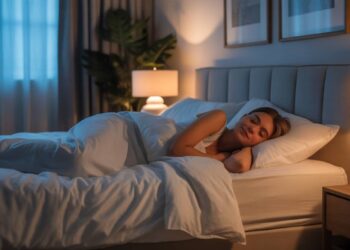In today’s digitally driven world, social media has woven itself into the fabric of our daily lives. From morning scrolls to late-night binges, platforms like Instagram, Twitter, and TikTok keep us connected, entertained, and informed. However, this constant connectivity comes at a cost—our sleep. The very tools that enhance our social interactions may also be sabotaging our ability to achieve restful nights. Understanding how social media impacts sleep is crucial for developing healthier habits and reclaiming your nights. Dive into the intricate relationship between your online activities and your nightly rest, and discover strategies to balance your digital life with quality sleep.
Key Takeaways
- Social Media’s Dual Role: While social platforms keep us connected, excessive use can disrupt sleep patterns and overall sleep quality.
- Blue Light Impact: Screens emit blue light that interferes with melatonin production, delaying sleep onset.
- Emotional Engagement: Engaging content can heighten emotions, making it harder to unwind before bedtime.
- Sleep Hygiene Strategies: Implementing boundaries and utilizing technology can mitigate the negative effects of social media on sleep.
- Professional Support: Persistent sleep issues may require consultation with healthcare providers and sleep specialists.
Understanding the Impact of Social Media on Sleep
Introduction to Social Media and Sleep
Social media is now like an extra limb for many folks, eating up hours as they scroll, chat, and binge-watch. But here’s the kicker: the same platform that keeps you connected may also tinker with your snooze time. Getting why this happens can help you develop better habits and catch those well-deserved Z’s. Oh, and if you’re super curious about how gadgets can help with rest, hit up our article about sleep tracking technology.
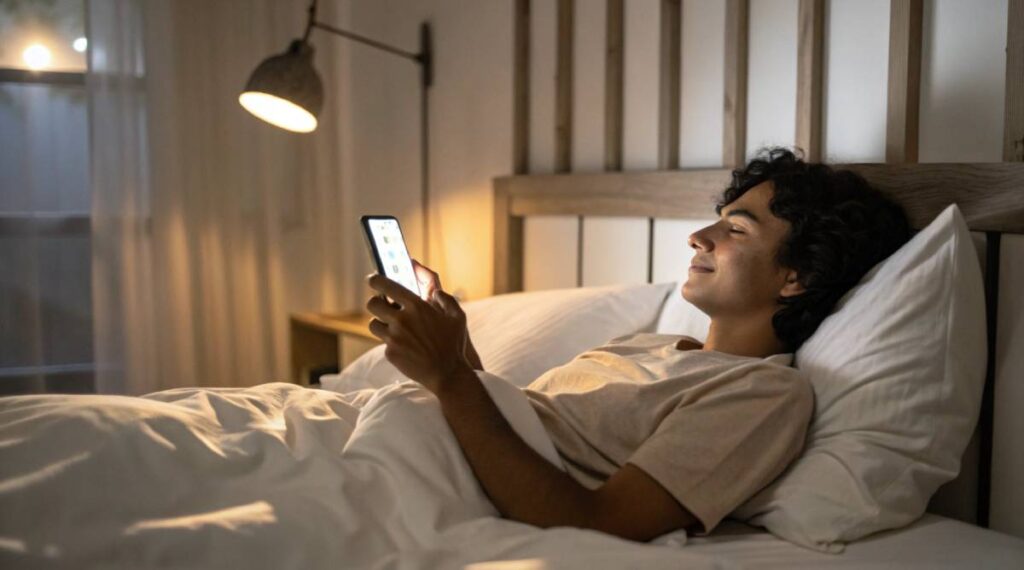
How Social Media Affects Sleep Patterns
Social media plays a sneaky role in messing with your sleep. Here’s how it throws a wrench in your sleeping patterns:
| Factor | Impact on Sleep |
|---|---|
| Late-Night Usage | Engaging with social media right before bedtime can keep you up past your bedtime. Ready to know more? Dive into our section about smartphone sleep mode. |
| Emotional Stimulation | Emotional roller-coasters caused by social media can pump you up or stress you out, making it tricky to wind down. |
| Blue Light Exposure | Watching the screen light up in blue can mess with the production of melatonin in your body – the sleep hormone. Curious? Check out our piece on blue light blocking effectiveness. |
| Screen Time | Gazing at screens too long not only strains your peepers but fires up your brain, both of which may keep sleep away. Want to see the benefits of unplugging before bed? Click over to our guide on tech-free sleep benefits. |
The way social media affects sleep isn’t just simple math; it’s a tangled web of distractions. Once you grasp these issues, you, your kiddos, and even techno-geeks can work smarter towards getting more restful sleep. For tricks on optimizing your shut-eye, check out our tips on cool stuff like smart mattresses and wearable sleep technology.
“Social media is a modern-day double-edged sword—while it connects us, it can also disrupt the very rest that fuels our daily lives.” – Dr. Laura Mitchell, Sleep Specialist
Armed with this knowledge, you’ll be prepped to dive further into how social media habits impact sleep in the rest of this piece. If you need some handy tools and tips, peek at our article about smart alarm clocks.
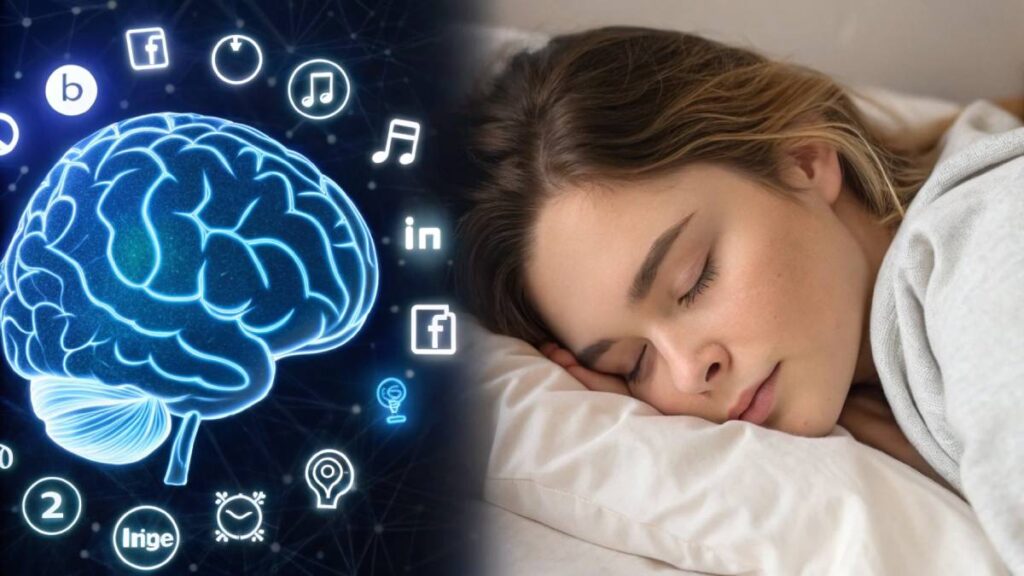
Social Media Habits and Sleep Quality
The Influence of Late-Night Social Media Use
Who hasn’t found themselves glued to their phone screen, thumbing through social media way past bedtime? We all know that when we get caught up in endless scrolling, sleep often becomes the casualty. It turns out when you’re fixated on the latest viral dance challenge or laughing at memes, your brain is getting revved up instead of winding down. You get all sorts of emotional and this keeps the brain humming, making it tough to drift off into dreamland.
Take a peek at some stats that really hammer home this point:
| Hours Before Bed | % Reporting Poor Sleep |
|---|---|
| < 1 hour | 75% |
| 1-2 hours | 50% |
| > 2 hours | 20% |
Being in the know about how nighttime social surfing messes with sleep might push you to shake things up. It’s about realizing how much that late-night socializing can throw a wrench in your sleep schedule. If you’re itching for some tips on taming your screen time, you might want to check out our piece about screen time guidelines for better sleep.
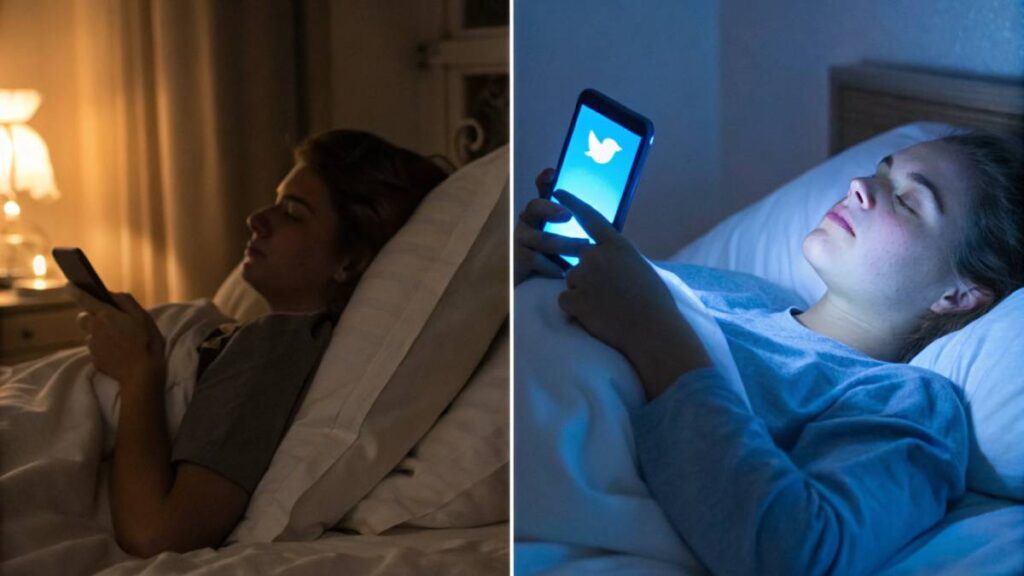
Blue Light Exposure and Circadian Rhythm Disruption
It ain’t just the content; it’s also those gadgets themselves messing with our sleep mojo. Those bright screens from our trusty devices blast blue light, which can totally disrupt your natural sleep groove. That blue hue tricks your brain into thinking it’s daytime, hampering melatonin production—the secret sauce for snoozing.
Have a gander at this:
| Type of Light Exposure | Melatonin Suppression (%) | REM Sleep Delay (min) |
|---|---|---|
| Blue Light | 85% | 30 |
| Red Light | 10% | 5 |
| No Light | 0% | 0 |
If you’re keen on keeping your shut-eye schedule sharp, consider cutting down on blue light in the evening. Using blue light filters or tweaking device settings might save that precious beauty sleep. Get the lowdown on blue light blocking effectiveness and its impact on slumbering like a baby.
If your tussle with screens and sleep sounds familiar, there are plenty of swap-ins and hacks out there to boost your bedtime rituals. Swing by our section on tools and apps to help with sleep for some nifty tips.
Dialing back on those late-night Instagram sessions and watching out for blue light could mean better Zzz’s. Keep track of these habits, and you’ll likely find yourself waking up refreshed—like a superhero without the cape.
Technology’s Role in Messing Up Your Sleep
In today’s screen-obsessed world, gadgets and gizmos are playing havoc with our ZZZs. From late-night scrolling binges to the Instagram-induced FOMO, figuring out how these digital earbuds are disturbing sleep is key to catching better snoozes.
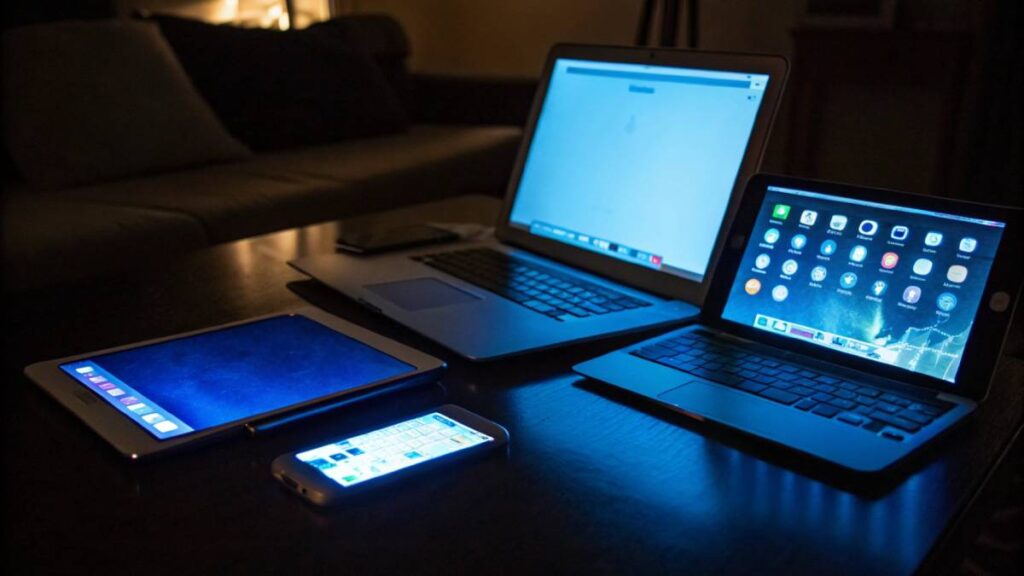
Beat the Screens: Get Better Sleep
Cutting back on screen time might just be your ticket to better sleep. Here’s the scoop:
- Cut Down on Pre-Bedtime Tech: Put a halt to your devices at least an hour before you plan on hitting the hay. This means saying goodbye to phones, tablets, laptops, and flat-screen time.
- Engage Night Gear: Switch on that night mode or blue-light blocker on your gadgets. This step can help keep blue light, the troublemaker that messes with your sleepy hormone—it’s called melatonin—at bay.
- Make Bedrooms No-Phone Zones: Keep your sleep space, and especially your bed, gadget-free. Train your brain to think about sleep rather than Twitter in bed.
| Bedtime Tactic | What to Do |
|---|---|
| Put down devices | At least one hour pre-sleep |
| Engage blue-light defense | Use night mode on all gadgets |
| Tech-free sleep sanctuaries | Make your bedroom a no-screen zone |
Get the full lowdown on dodging those sleep-disruptive blue rays in our article on blue light blocking tricks.
Social Media’s Sneaky Role in Sleep Troubles
Hanging out online can team up with all sorts of sleep issues. The never-ending pings and dings from social apps can bring on troubles like tossing and turning at sleep time, and even anxiety-related sleep headaches.
- Can’t-Sleep Syndrome (Insomnia): Spending way too much pre-bedtime on social feeds can make dropping off to sleep a chore.
- Nighttime Jitters (Anxiety): Those persistent notifications and the low-level stress of keeping up with the digital Joneses can fuel your night-time worries.
- Night Owl Syndrome: Late-night Twitter-scrolling can shift your sleep schedule into a later timezone, causing miserable mornings.
| Sleep Snag | Blame it on Social Media |
|---|---|
| Insomnia | Devices make sleeping tough when used before bed |
| Sleep anxiety | Notification overload amps up anxiety |
| Shifted sleep patterns | Late night scrolling wrecks sleep hours |
Get clued in on how tech’s affecting your beauty sleep and discover potential fixes in our posts on tracking your sleep with tech and learning the perks of smart mattresses.
Taming your screen habits and getting wise to your scrolling ways can seriously upgrade your sleep game. Knowing what tech does to your dreams lets you grab better shut-eye and feel human again. For more snooze-savvy advice, hit up our guide on tech-free sleep wins.
Managing Social Media Use for Better Sleep
Finding the right balance between scrolling socials and catching Z’s can be tricky. But with a few boundary-setting tricks and some good ol’ sleep habits, you can dodge the bad vibes from late-night screen time.
“Creating boundaries with technology is not about disconnecting from the world, but rather reconnecting with your need for rest and rejuvenation.” – James Reynolds, Digital Wellness Expert
Setting Boundaries for Social Media Engagement
Keeping limits on your social life (the digital kind) is crucial for getting quality shut-eye. Here’s some tried-and-true advice:
Designated “No-Screen” Time
- Pick a time before bed when screens get the boot—phones, laptops, the whole lot. This makes room for some chill time, helping your body to ease into sleep mode without pixel peeping.
Social Media Curfews
- Set yourself a digital bedtime. Maybe cut off the scrolling after 8 PM and swap in some downtime faves like reading something that’s printed on paper or practicing some “Om” time with meditation.
Notification Management
- Silence those beeps and buzzes. Flip your device to “Do Not Disturb” during snooze hours to keep interruptions at bay. Check out more on smartphone sleep mode.
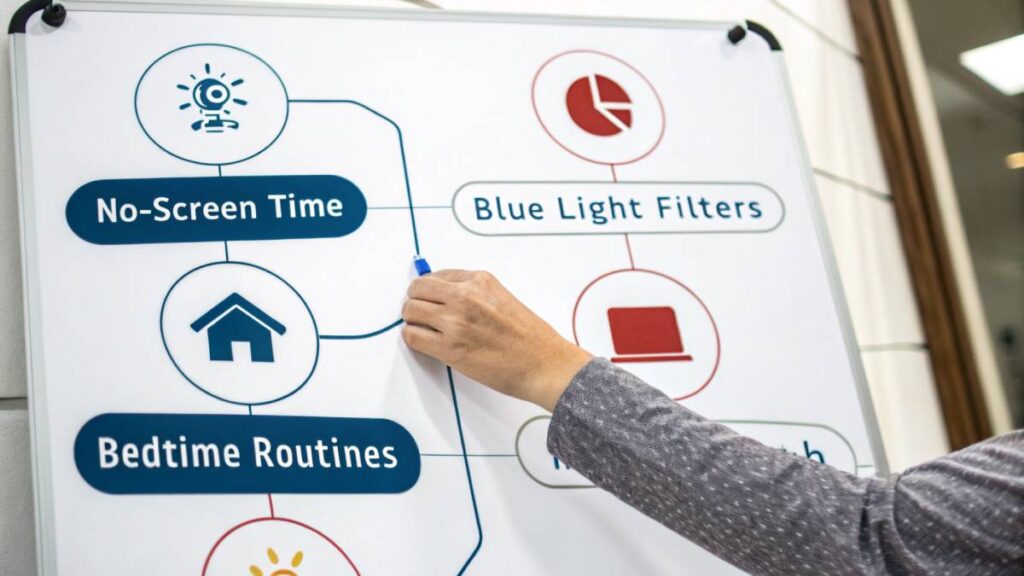
Tips for Improving Sleep Hygiene
Good sleep habits mean crafting a cozy sleep vibe and a routine that screams “It’s sleepy time!” Here’s how:
Create a Relaxing Bedtime Routine
- Set the mood with mellow activities like a bit of light reading, soaking in a warm tub, or doing mindfulness exercises. It’s like telling your brain and body, “Hey, it’s bedtime!”
Sleep-Friendly Environment
- Your bedroom should be like a sleep cave: dark, silent, and cool. Think about grabbing some noise-cancelling sleep devices to nix any unexpected sounds.
Consistent Sleep Schedule
- Stick to a sleep schedule like glue—same time to crash and rise, even on those lazy Sundays. This regularity helps keep your internal clock ticking right.
Limit Screen Time and Blue Light Exposure
- Cutting down on screen time before bed helps avoid that pesky blue light, keeping your body’s sleep cycle on track. Use blue light blocking effectiveness gadgets or apps to combat any leftover glow.
Mix these habits and gadgets into your routine, and you’ll handle your social media better, leading to sweeter dreams. For more high-tech aids, check out smart home sleep optimization and peek into sleep tracking technology to ensure your nights are as restful as possible.
Tools and Apps to Help with Sleep
Technology’s all about hooking us up with gadgets and gizmos to boost our sleep. We’ll peek into two powerhouse categories: sleep-tracking apps and blue light filter apps to keep those pesky screens from messing with our Z’s.
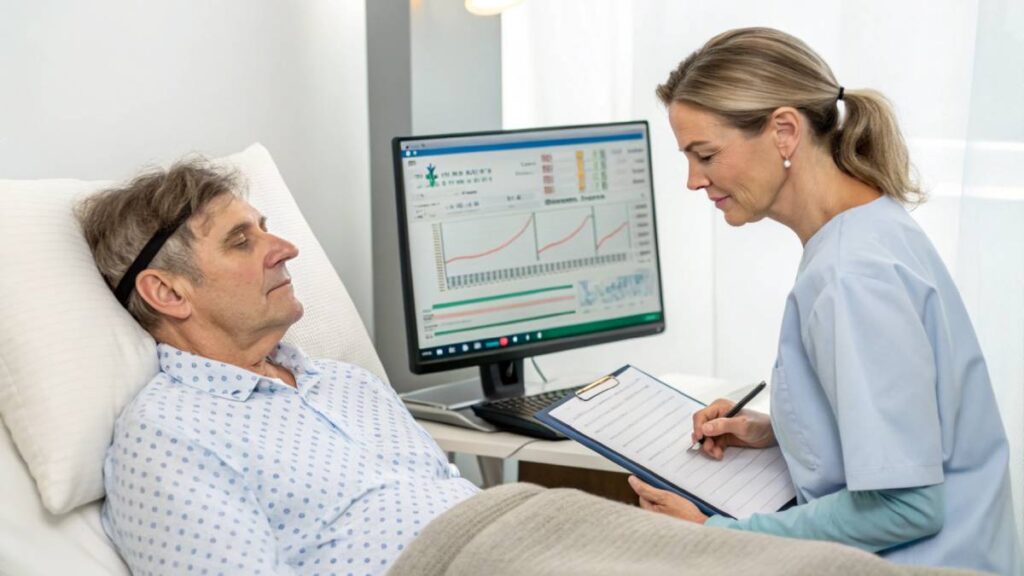
Sleep Apps for Tracking and Improving Sleep
Imagine having a little sleep detective in your pocket. Sleep apps are like your sidekick, spotting bad habits and helping polish your snooze routine. They track your sleep duration, stages, and overall quality, often teaming up with wearable devices for the full scoop.
| Sleep Metrics | Description |
|---|---|
| Sleep Duration | How long you actually snooze each night |
| Sleep Stages | The night saga including light, deep, and REM sleep |
| Sleep Quality | A scorecard of how well you snooze, covering tosses and turns |
These apps can be neat alarm clocks too, nudging you awake when you’re barely dreaming. Some even throw in relaxing sounds to help you drift off. Curious about which ones are the tops? Check out our guide on best sleep apps.
Handy Links:
- best sleep apps
- sleep tracking technology
- wearable sleep technology
- smart mattress perks
- home sleep eeg gadgets
Blue Light Filter Apps for Screen Time Reduction
That bright blue glow from your gadgets? It can throw your body’s clock right off track. Enter blue light filter apps—they step in to dim that brightness, syncing up with your natural sleep cycle.
| Feature | Description |
|---|---|
| Blue Light Reduction | Tones down the blue glow from screens |
| Automatic Scheduling | Turns on the filter at chosen times |
| Customization | Lets you tweak color warmth and brightness |
With these apps, your screen stops fighting with your internal clock, and it’s sweet dreams ahead. For more about how these filters work their magic, check out our piece on blue light blocking effectiveness.
Extra Resources:
- blue light blocking effectiveness
- smartphone sleep mode
- circadian lighting tricks
- benefits of ditching tech at night
- smart alarm clocks
Mixing these tools into your bedtime lineup can help turn down the noise of social media and lead to some seriously solid shut-eye.
Seeking Professional Help
Tackling Sleep Woes with the Docs
If endlessly scrolling through social media is keeping you up, it might be time to hit up a healthcare provider. It’s amazing how much those late-night Instagram rabbit holes can mess with your shut-eye, right? Getting professional advice could make a world of difference when it comes to crashing out properly at night.
Before your visit, it’s handy to think about your social media habits and any other sleep blockers you can think of. Expect your doc to chat about some habit changes or point you towards special treatments. They might even set you up with some snooze-friendly gadgets like sleep tracking technology or wearable sleep bands to help you keep tabs on your Zs.
| Common Sleep Annoyances | First Steps with the Docs |
|---|---|
| Insomnia | Therapy, Handy Sleep Tips |
| Sleep Apnea | Sleep Tests, CPAP Gear |
| Restless Legs | Meds, Iron Fixes |
| Rhythm Mix-Ups | Light Tricks, Melatonin Drops |
Chatting with Sleep Pros for Long-Term Sleep Drama
For those stubborn sleep issues, sometimes a regular doc just won’t cut it. That’s where the sleep specialists come in. These folks know their stuff about tricky sleep disorders and can give you not just the lowdown but actual fixes for problems like insomnia or sleep apnea. They might even recommend a sleep clinic for some deep sleep-dive sessions to figure out what’s going on under the covers.
Special sleep tests can give a clear picture of what’s stealing your snooze, leading to some pretty nifty solutions like cognitive therapy or nifty gadgets for sleep apnea. Tech like home sleep EEG gizmos and AI sleep tools can be part of the mix too, helping fine-tune your sleep setup for that sweet, sweet slumber.
| Treatment Hacks | Cool Tech Gadgets |
|---|---|
| Brain Training | Phone Sleep Settings, Sleepy Apps |
| Sleep Machines | CPAP, At-Home Sleep EEG |
| Life Overhauls | Light Tech for Rhythms, Sound-Killer Sleep Gear |
If social media’s keeping you up, a pro might be just what you need to hit the sack properly. Whether it’s your family doctor or a sleep expert, the right advice plus some modern tech can seriously help you catch those peaceful Zs.
Main Tips
- Establish a Routine: Go to bed and wake up at the same time every day to regulate your internal clock.
- Optimize Your Sleep Environment: Keep your bedroom cool, dark, and quiet to promote uninterrupted sleep.
- Limit Screen Time: Avoid screens at least an hour before bedtime to reduce blue light exposure.
- Use Technology Wisely: Implement blue light filters and set device curfews to minimize screen-related disruptions.
- Seek Professional Help: Consult healthcare providers if sleep issues persist despite lifestyle changes.
Conclusion
The pervasive influence of social media on our daily lives extends into the realm of sleep, often undermining our ability to rest effectively. From the disruptive effects of blue light and emotional stimulation to the challenges of late-night usage, understanding these impacts is essential for cultivating healthier sleep habits. By setting clear boundaries, utilizing supportive technologies, and seeking professional guidance when necessary, you can mitigate the negative effects of social media on your sleep. Prioritizing sleep hygiene and mindful social media practices not only enhances your nightly rest but also contributes to overall well-being and daytime productivity. Embrace these strategies to reclaim your nights and wake up refreshed, ready to tackle each day with renewed energy.
FAQs
How does social media usage before bed affect sleep quality?
Using social media before bed can keep your brain active and exposed to blue light, which suppresses melatonin production. This makes it harder to fall asleep and can reduce the overall quality of your sleep by disrupting sleep cycles.
Can reducing screen time improve my sleep?
Yes, reducing screen time, especially before bedtime, can significantly improve sleep quality. It allows your body to produce melatonin naturally and reduces mental stimulation, making it easier to fall asleep and enjoy deeper sleep stages.
What are some effective strategies to limit social media use at night?
Effective strategies include setting a designated “no-screen” time before bed, using blue light filter apps, turning off notifications, creating a relaxing bedtime routine, and establishing a consistent sleep schedule.
Are there specific apps that can help manage my social media use for better sleep?
Yes, there are several apps designed to help manage screen time and reduce blue light exposure. Examples include f.lux, Night Shift (iOS), Twilight (Android), and various sleep-tracking apps that encourage healthier digital habits.
When should I seek professional help for sleep issues related to social media use?
If you experience persistent sleep disturbances despite implementing self-help strategies, it may be time to consult a healthcare provider or sleep specialist. Professional guidance can address underlying issues and offer tailored treatments to improve sleep quality.
Resources
- Sleep Foundation: Social Media and Sleep
Comprehensive insights on how social media affects sleep and strategies to mitigate negative impacts. - Harvard Health Publishing: Blue Light Has a Dark Side
Research-based information on the effects of blue light on sleep and health. - Mayo Clinic: Healthy Sleep Tips
Practical advice on improving sleep hygiene and establishing healthy sleep habits. - National Sleep Foundation: Sleep and Technology
Articles exploring the relationship between technology use and sleep quality. - Healthline: Best Sleep Apps
Detailed reviews of top sleep-tracking and sleep-enhancing applications. - PubMed Central (PMC) – Social Media and Sleep Studies
Access to peer-reviewed studies exploring the impact of social media on sleep.
Final Thoughts
As social media continues to evolve and integrate into our lives, it’s essential to recognize and address its impact on our sleep. By implementing mindful usage habits, leveraging technology to our advantage, and seeking professional support when needed, we can mitigate the negative effects and enhance our sleep quality. Prioritizing sleep not only improves our physical health but also boosts our mental well-being, productivity, and overall quality of life. Striking a balance between digital engagement and restful nights is key to thriving in our connected world. Take proactive steps today to ensure that your relationship with social media supports, rather than hinders, your journey to restful and rejuvenating sleep.
Recommended Products and Accessories
- f.lux Blue Light Filter
- Automatically adjusts your screen’s color temperature based on the time of day to reduce blue light exposure.
- Sleep Mask with Built-in Bluetooth Headphones
- Block out light while listening to calming music or guided meditations to fall asleep faster.
- Adjustable Bedside Lamp with Warm Light Settings
- Create a relaxing ambiance in your bedroom with customizable lighting options.
- Noise-Cancelling Earbuds
- Eliminate disruptive sounds and enjoy peaceful sleep with high-quality noise-cancelling technology.
- Smart Alarm Clock with Sleep Tracking
- Monitor your sleep patterns and wake up gently during the optimal sleep phase.

